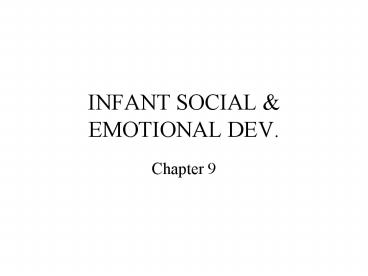INFANT SOCIAL - PowerPoint PPT Presentation
1 / 23
Title:
INFANT SOCIAL
Description:
... start new child care. SEPARATION ANXIETY. Begins at ... INFANT CARE AND ATTACHMENT. There is no evidence that quality infant care leads to attachment problems ... – PowerPoint PPT presentation
Number of Views:94
Avg rating:3.0/5.0
Title: INFANT SOCIAL
1
INFANT SOCIAL EMOTIONAL DEV.
- Chapter 9
2
ATTACHMENT
- E. Eriksons theory
- Security feeling the world is a safe,
predictable, nurturing place - Necessary stage for healthy emotional dev
3
ATTACHMENT
- Forming an emotional bond with at least one other
person - A bidirectional process
- Infants generally form attachments to multiple
caregivers
4
STRANGER ANXIETY
- Occurs at about 6-8 months
- Difficult time to start new child care
5
SEPARATION ANXIETY
- Begins at about 6 months
- Effects are less if child has multiple caregivers
at home - At child care
- parental trust and positive attitude
- parents dont stay to play
- child told when parent is leaving
- established routine
6
ATTACHMENT
- Secure (see p. 175)
- Insecure
- Insecure/avoidant ignore moms return
- Insecure/ambivalent alternate between upset and
rejection - Disorganized
7
INSECURE ATTACHMENTS
- Attachment behaviors are relatively fixed over
time but are able to change - Insecure/avoidant attachments may lead to
aggressive, impulsive, uncooperative behavior in
later years - Insecure/ambivalent attachments may lead to
timid, dependent, whining, inhibited behaviors in
later years
8
CULTURAL VARIATIONS
- Attachment theory may not be universally true
- In some cultures (ex. Japanese, Chinese) cultural
and parental attitudes and expectations and
childs temperament may affect attachment
behaviors of children
9
- SECURE ATTACHMENT IN BABIES REQUIRES
RESPONSIVENESS AND WARM PHYSICAL CONTACT within a
cluster of culturally appropriate behaviors
such as nursing, snuggling, carrying
10
INFANT CARE AND ATTACHMENT
- There is no evidence that quality infant care
leads to attachment problems - There is evidence that poor quality care may
contribute to attachment problems - Staff turnover
- Stressed, overworked caregivers
- Lack of individualized attention
- Lack of respectful. loving care
11
AUTONOMY
- E. Eriksons second stage of development
Autonomy V Shame and doubt - Begins at about 1 year of age
- Toddlers assert their individuality through
exploration, experimentation, self-determination
(no)
12
AUTONOMY, contd
- Aids in the development of autonomy
- Physical skills, such as walking and grasping
- Thinking skills, such as cause-and-effect
planning
13
AUTONOMY ISSUES
- Toileting
- Dressing
- Food
- Transitions
14
TRYING TIME FOR CAREGIVERS
- Caregivers need to support autonomy and
discourage shame and doubt by setting clear,
age-appropriate boundaries without being harsh
and punitive - Children need to feel loved and supported despite
tantrums and difficult behaviors
15
CULTURAL VARIATIONS
- Asian and other cultures stress
interconnectedness, not autonomy - Many societies stress dependence for girls/women
- There is debate about how to apply Eriksons
theory
16
TEMPERAMENT
- Three personality types
- Easy friendly, happy
- Difficult easily upset, have difficulty in
unfamiliar situations - Slow to warm up shy, reluctant to separate from
parents, less overtly emotional - Temperament seems to be stable throughout life
17
TEMPERAMENT
- Seems related to genetics and culture
- African-Americans tend to be emotionally
expressive verve - Asians calm, reserved, slow-to-warm-up
18
EMOTIONS
- Emotions are universal
- Social referencing infants refer to adult
emotional reactions to determine how they should
feel - Infants appear to feel the basic emotions happy,
sad, pain, surprise, fear, anger
19
ABUSIVE PARENTS
- Seem to have a poor ability to read their
childrens emotional expressions (through body
language, facial expressions, and vocalizations)
20
EMOTIONAL REGULATION
- Children have relatively little ability to
control ones (negative) emotional feelings - Caregivers can help through
- Soothing touch
- Distraction
21
EGOCENTRISM
- Piaget says kids perceive themselves as central
to all that happens (egocentric) - But kids can be empathetic and can consider the
needs of others - Some children are naturally more empathetic
others need to be trained
22
SPECIAL NEEDS CHILDREN
- Some special needs interfere with healthy bonding
- Hearing
- Abused
23
INTERVENTIONS
- Nurturing, responsive care
- Quiet, safe, predictable environment
- Positive social interactions
- Modeling by adults of social interactions































